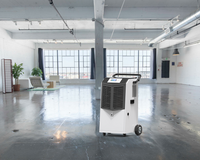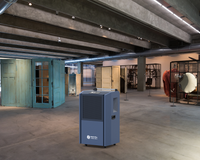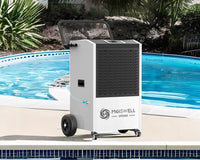When considering purchasing a dehumidifier, one of the common concerns is the operating cost. Many people wonder if running a dehumidifier will significantly increase their energy expenses. In this article, we'll address the question: Are dehumidifiers expensive to operate? We'll explore factors that impact their energy consumption and provide insights to help you make an informed decision about the cost-effectiveness of using a dehumidifier.
Energy Efficiency
1. Energy Star® Certified Dehumidifiers: Energy Star® certified dehumidifiers are independently tested and verified to meet strict energy efficiency standards. These units consume less energy while delivering the same or better performance compared to non-certified models. Investing in an Energy Star® certified dehumidifier can help reduce your energy costs over time.
2. Energy-Saving Features: Many dehumidifiers offer energy-saving features such as programmable timers, humidity sensors, and adjustable fan speeds. These features allow you to customize the operation based on your specific needs, optimizing energy consumption and minimizing operating costs.
Size and Capacity
1. Proper Sizing: It's essential to choose a dehumidifier that is appropriately sized for the space you intend to dehumidify. An undersized unit may run continuously, straining its components and consuming more energy. Conversely, an oversized unit may cycle on and off too frequently, also wasting energy. Ensuring the right sizing will maximize energy efficiency and reduce operating costs.
2. Humidity Conditions: If you're operating a dehumidifier in an extremely humid environment, it may need to work harder and run for longer periods to achieve the desired humidity level. This may result in slightly higher energy consumption. However, using an appropriately sized dehumidifier and setting it to maintain a comfortable humidity level can help optimize energy usage.
Usage Patterns
1. Relative Humidity Levels: If the relative humidity in your space fluctuates throughout the day, you can adjust the dehumidifier's settings accordingly. Running the dehumidifier during peak humidity periods and reducing its operation during lower humidity times can help conserve energy.
2. Specific Areas of Operation: If you only need to dehumidify specific areas within your business space, consider using portable or zone-specific dehumidifiers. These units allow you to target moisture-prone areas rather than dehumidifying the entire space, leading to more efficient energy use.
While there will be some increase in electricity consumption when operating a dehumidifier, they are generally designed to be energy-efficient. By choosing an Energy Star® certified dehumidifier, properly sizing the unit, utilizing energy-saving features, and considering usage patterns, you can minimize the operating costs associated with running a dehumidifier.





